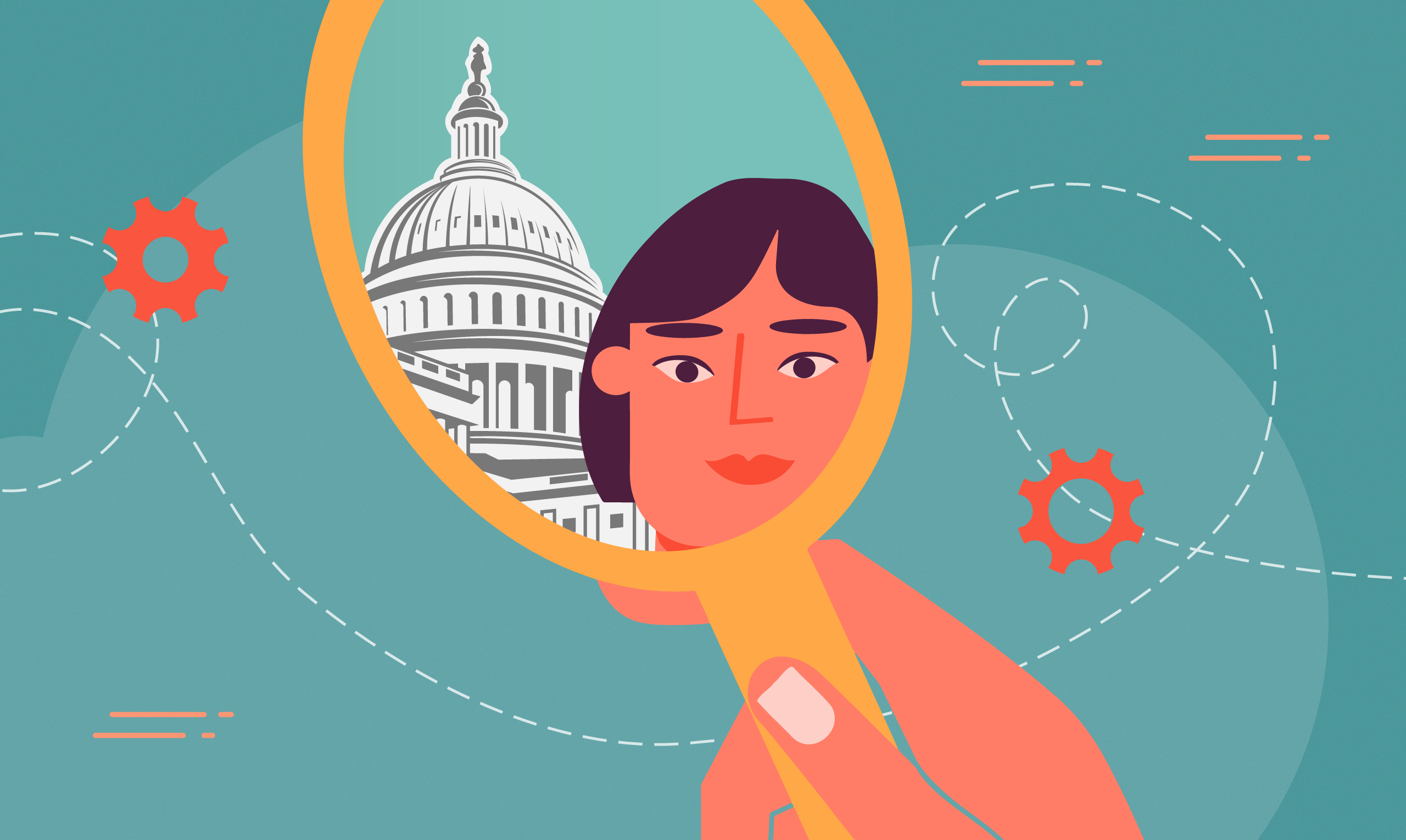Readers of this blog have undoubtedly heard of Project 2025 by now. The 900-page document has been widely criticized for its ambitious and extreme plans to undermine and politicize career civil servants in the federal government, eliminate important safeguards against weaponization of government law enforcement, limit freedoms like access to reproductive healthcare, and much more. It aims to give the president unchecked power over the executive branch as a means to achieving policy goals that will negatively impact life for millions of Americans. The consequences will be far-reaching and difficult to reverse.
Thankfully, the government accountability field has prepared for years to preserve our system of checks and balances and ensure there are consequences for those who abuse their positions of power. Through coordination, litigation preparation, and public education, these organizations — including many Democracy Fund grantees — are preparing to halt and hinder these dangerous proposals.
In this piece, we’ll get deeper into how Project 2025 is a threat to democracy, how the accountability field is responding, and why funders must do more to provide sustained support to the field.
How is Project 2025 a threat to democracy?
Project 2025 is a threat decades in the making. The project is spearheaded by The Heritage Foundation and a coterie of influential groups, including America First Legal, Alliance Defending Freedom, Moms For Liberty and others that have espoused an authoritarian vision for governing. Its authors have advocated for ending marriage equality and LGBTQ+ protections, restricting abortion rights, mass deportations of immigrants, conservative takeovers of school boards, curtailing voting rights, and much more.
The proposals in Project 2025 touch on every aspect of federal policy-making, from education, to climate, to national security. At its foundation is a desire to weaken nonpartisan expertise throughout the government, increase the power of partisan officials, limit checks on the president, and roll back rights and freedoms to align with an authoritarian worldview. If put into place, these actions would not only reduce the effectiveness of the federal government, they would significantly enable abuses of power. Here’s what it would look like:
1. Weakening nonpartisan expertise would politicize and hamper essential government functions.
Project 2025 calls for the president to re-issue an executive order that allows for the replacement of a large swath of career officials, including scientists, researchers, and economists, with politically appointed cronies (known as “Schedule F”). These new officials would be selected based on loyalty tests and the extent to which they agree with the policies laid out in Project 2025, rather than qualifications and expertise. This opens the door to mismanagement of critical government functions, from air traffic controllers to food inspectors. A sobering example of this dynamic was illustrated by the Federal Emergency Management Agency (FEMA) response to the devastating aftermath of Hurricane Katrina in 2005, with unqualified political appointees being cited as one reason for the government’s failures. More recently, public health researchers cited the appointment of a Coronavirus Response Coordinator with vague authorities as one of the key factors contributing to haphazard inter-agency coordination during the COVID-19 pandemic.
2. Removing checks on the president would lead to the weaponization of law enforcement.
Project 2025 aims to politicize and weaponize the Department of Justice and other law enforcement agencies. There is a long-held practice of insulating the Department of Justice from the partisan goals of the president. This firewall protects the rule of law against real or perceived bias or influence. It prevents a president from ordering law enforcement agencies to selectively enforce the law for the benefit of his allies or detriment of his opponents. Project 2025 seeks to turn this norm on its head, by overturning policies that limit the president’s direct communication with the Attorney General and making explicit that all litigation strategies must be aligned with the president’s agenda. Project 2025 also proposes a vast expansion of the number of political appointees within the FBI, further opening the door for partisan motivations guiding investigatory decisions, rather than unbiased assessments of the law.
The impact of these changes could be the targeting, harassment, and eventual prosecution of perceived political foes of the president, selective enforcement of the law to benefit industries aligned with the president’s party, and legal actions against district attorneys who do not strictly follow the president’s agenda. Put simply, the rule of law — the foundation of our legal system – is at risk.
3. Rolling back federal policies that protect women, LGBTQ+ people, and communities of color would open the door to discrimination.
Project 2025 relies on a core element of the playbook used by authoritarians around the world — idolizing white, heterosexual men and the nuclear family while denigrating those who fall outside of this definition of a “real” American. To this end, Project 2025 seeks to roll back access to reproductive healthcare, target LGBTQ+ youth and families, and unravel federal policies to advance diversity and inclusion. It proposes eliminating guaranteed free access to emergency contraception while criminalizing the mailing of abortion medication — which could result in a de facto nationwide abortion ban. It orders the National Institute of Health to study the purported “negative effects” of gender affirming care for children while enabling adoption agencies to discriminate against same-sex couples. And it broadly prohibits federal agencies from working to ensure their programs, hiring processes, and staff training utilize diversity, equity, and inclusion principles. Taken together, these policies would make the government more hostile and less responsive to women, LGBTQ+ people, and communities of color — potentially turning back decades of progress.
These are just three examples. The plan is extensive, and its architects hold many ideas that are dangerous to our democratic system of checks and balances. For example, a key author of Project 2025, Russell Vought, argues the president should use an illegal practice called “impoundment” — the withholding of congressionally appropriated funds – to effectively defund any federal program or agency he wishes. The threat to American values and civil liberties is clear.
How is the accountability field responding?
The pro-democracy response to the authoritarian ideology underpinning a platform as dangerous and sweeping as Project 2025 must be bold and comprehensive. It requires a broad coalition of groups with expertise on issues from healthcare to tax policy that are ready to fight in court and the court of public opinion. Thankfully, strategies for slowing or stopping the worst aspects of Project 2025 are in motion, and the field is coordinating to respond on Day One. Activities groups are pursuing include:
1. Research on Project 2025 policies and their impact.
The fact we know as much as we do about the proposals in Project 2025, and how dangerous they are, is due in large part to the indefatigable efforts of groups like Accountable.US, which shed light on the vast network of groups, supporters, and funders of the project — many of whom are influential political operatives. Documented helped uncover secret training videos provided to the supporters of Project 2025, providing additional context for how it could be implemented and even advice from its authors on how to avoid the scrutiny of the pro-democracy field. And the Center for American Progress reviewed all 900+ pages to highlight its most pressing threats. Without these efforts, the democracy field would be less informed — and likely less prepared to respond. Accountability-focused organizations have proven their worth, confirming the need to consistently support their efforts.
2. Raising awareness around Project 2025 policies and their impact.
The research underway is not only essential for groups that are planning legal and other responses, it is key to raising the public’s awareness. Polling now shows that a majority of Americans have heard of Project 2025 (a significant increase from just a few months ago) and more importantly, it shows that Americans view the policies negatively. Indeed, it is hard to imagine that Project 2025 would receive almost-daily front page coverage in national news outlets and extensive coverage in popular shows like Last Week Tonight or The Daily Show without the tireless efforts of these organizations.
3. Preparing for the legal and regulatory battles ahead.
Many of the policies in Project 2025 depend on regulatory and executive actions. To prevent or delay them, Democracy Forward is coordinating a broad range of issue-advocacy groups to prepare legal and other responses. They have also been a leading voice in congressional testimony regarding the harms of Project 2025. The Partnership for Public Service is working with media outlets to tell stories about real-life civil servants to help the public better understand the critical role of federal workers. It is also helping ensure federal employees understand their rights, building off of successful work coordinated by the Partnership, Protect Democracy, the Project On Government Oversight, Democracy Forward, and others, to advance a new federal rule that will make it harder to implement Schedule F.
4. Strengthening guardrails to prevent abuses
Many dangerous elements of Project 2025 are possible only because of weak or nonexistent checks on presidential power. An over-reliance on norms and policies that the president may discard at will paves the way for abuses. Combined with inaction and even assent from Congress and the courts, this is a problem decades in the making and one that will persist without further action. The accountability field is working to bolster guardrails to prevent abuse by:
- Identifying weaknesses in the law and proposing model reforms. This includes research by Protect Democracy to better understand the weaknesses an authoritarian can exploit and a blueprint for model guardrail legislation from CREW.
- Supporting key oversight functions in government. This includes work by the Project on Government Oversight to strengthen internal watchdogs, including Inspectors General, and work by the Government Accountability Project and Whistleblower Aid to support disclosures by government employees and contractors.
- Demanding the courts and Congress hold the executive branch accountable. This includes legal advocacy and court filings from the Constitutional Accountability Center and work by Public Citizen to pressure Congress to investigate government wrongdoing.
What funders can do now
The work described above is just a snapshot of the ongoing efforts to understand and fight back against Project 2025. These efforts must be sustained through, and beyond, 2025. The threat encapsulated by the extreme policy proposals within Project 2025 existed before its publication and will continue to loom over our democracy even if not implemented next year. While the project is notable for its audacious scope, its policies have been years in the making and include the core tenets of the authoritarian movement.
We must sustain funding for research, communications, legal, and advocacy efforts about Project 2025, its authors and supporters: it guts checks and balances, threatens the rule of law, and is a brazen attempt to turn our democracy toward authoritarianism.
Please reach out to learn more about specific funding gaps, needs, and opportunities that Democracy Fund has gathered from our grantees and network.

